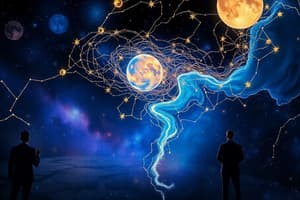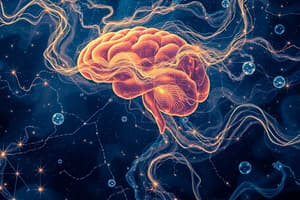Podcast
Questions and Answers
What does Freud's wish-fulfillment Theory suggest about dreams?
What does Freud's wish-fulfillment Theory suggest about dreams?
- Dreams are solely biological processes.
- Dreams have no meaning.
- Dreams are random neural activations.
- Dreams allow us to express otherwise unacceptable feelings. (correct)
Freud's wish-fulfillment Theory is supported by scientific evidence.
Freud's wish-fulfillment Theory is supported by scientific evidence.
False (B)
What does the Information-processing Theory propose about dreams?
What does the Information-processing Theory propose about dreams?
Dreams help us sort out the day's events and consolidate our memories.
Information-processing Theory effectively explains why we dream about experiences we have not had.
Information-processing Theory effectively explains why we dream about experiences we have not had.
What is the Physiological function Theory regarding dreams?
What is the Physiological function Theory regarding dreams?
Physiological function Theory explains why we have meaningful dreams.
Physiological function Theory explains why we have meaningful dreams.
What does the Neural Activation Theory state?
What does the Neural Activation Theory state?
Neural Activation Theory suggests the content of dreams is entirely random.
Neural Activation Theory suggests the content of dreams is entirely random.
What is the basis of the Cognitive Development Theory in terms of dreams?
What is the basis of the Cognitive Development Theory in terms of dreams?
Cognitive Development Theory fully addresses the neuroscience of dreams.
Cognitive Development Theory fully addresses the neuroscience of dreams.
Flashcards are hidden until you start studying
Study Notes
Freud's Wish-Fulfillment Theory
- Dreams serve as a means to express unacceptable feelings and desires.
Problems with Freud's Wish-Fulfillment Theory
- Lacks scientific backing and validation.
- Dreams can have multiple interpretations, making the theory too simplistic.
Information-Processing Theory
- Dreams play a role in sorting daily events and consolidating memories for better retention.
Problems with Information-Processing Theory
- Questions arise about dreams that revolve around experiences not encountered in reality.
Physiological Function Theory
- Regular stimulation of the brain during REM sleep may be crucial for developing and maintaining neural pathways.
Problems with Physiological Function Theory
- Does not clarify why dreams can hold significance or meaning for individuals.
Neural Activation Theory
- REM sleep triggers random neural activity, producing visual memories that the brain crafts into coherent narratives.
Problems with Neural Activation Theory
- The process of weaving narratives reflects aspects of the dreamer's identity and personal experiences.
Cognitive Development Theory
- Dream content is indicative of the dreamer's cognitive maturity, encompassing their knowledge and understanding.
Problems with Cognitive Development Theory
- Fails to address the biological and neurological aspects involved in the phenomenon of dreaming.
Studying That Suits You
Use AI to generate personalized quizzes and flashcards to suit your learning preferences.




